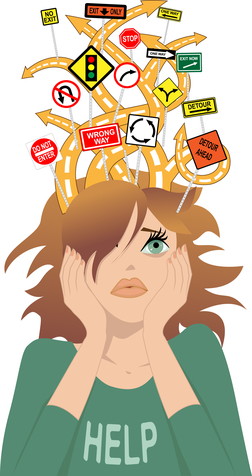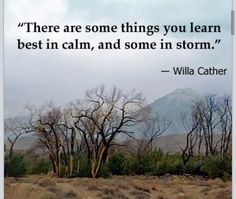 This past week my 13-year old was officially diagnosed with ADHD. It’s both a relief and a huge burden for me.
This past week my 13-year old was officially diagnosed with ADHD. It’s both a relief and a huge burden for me.
The relief comes from the fact that I can now put a name to so many of the frustrations that have plagued both my daughter and myself over the past 10 years. I’m not a bad parent, and she’s not lazy. Phew!
The burden that I now bear is that fuzzy gray horizon of what comes next? What are my options? What’s the right answer? Where do I begin? There’s a lot of information out there, and everyone I speak to seems to offer new opinions and advice.
When I reflect on it, I recognize this as a familiar feeling. I’ve been here many times before, both in my personal life as well as my professional life. In fact, I realize that feeling overwhelmed is usually the beginning of any big challenge I have faced. Now my next step is to get organized and climb this mountain, one step at a time.
Being that this is a blog geared towards nonprofits, I’ve also been thinking about how the world of fundraising often feels like the chaos of ADHD. There are so many things on our to do list, and so many solutions clamoring for our attention. Regardless of what fundraising challenge you are currently tackling – be it writing year-end appeals, researching foundations, or planning your materials for your next capital campaign – when you are lost in the fog, here are some thoughts to find your path:
- Inform yourself, but don’t get sucked down the internet black hole.
One lesson that I continue to learn (often the hard way) is the sheer amount of information that exists in our world. It’s so easy to get lost going from one resource to another, always looking for the elusive “perfect” solution.
In my opinion, information is good, but too much information is a time suck and a recipe for chaos.
So how do I address this? On my good days, when I’m practicing what I preach, I allot myself a designated chunk of time. I set the timer, and then turn off email notifications, Facebook, and the cute YouTube videos. I may write a specific list of search terms to Google, or a list of websites I want to check for reference material. Today’s list might be exploring medications. Tomorrow might be alternatives to medication. However, when that timer goes off I stop. And regroup.
- Make an educated decision and go for it.
I am an admitted perfectionist and this one’s hard for me. There may not be one perfect solution, but there are lots of good decisions that will serve you well. The catch is that you actually have to act on them.
So once you’ve armed yourself with a reasonable (a.k.a. not overwhelming) amount of information, make a decision, make a plan, and follow through. Close your eyes, trust yourself and go with what feels right to you, instead of getting caught up in what everyone else is telling you is right.
- Listen to your results and learn from your experiences.
Earlier this year I read The Confidence Code by Katty Kay and Claire Shipman. It was a fascinating dive into the biological, psychological, and chemical science behind the differences in confidence between men and women, and I highly recommend it. One of my biggest take-aways from the book was to “fail fast.”
“…rather than waiting for your idea or plan to pan out perfectly, you should move quickly to figure out what works and what doesn’t.”
While at its surface this scares my perfectionist nature to death, when I take time to think about it, it makes sense. During my first science test in 6th grade, I couldn’t get past the 3rd question. I got a 30%. It was horrifying for me, but I survived to tell the tale, and I think that was the moment where I taught myself how to take tests.
- When all seems lost, take a walk.
I’m an ardent advocate for spending time in nature. The latest book that I read was The Nature Fix by Florence Williams. She explores the impact of different “doses” of nature on people’s physical and mental health. And she has a whole chapter on the effects of nature on ADHD. Looking at recent studies on the relationship between ADHD and outdoor activity:
“In one experiment, exposure to nature reduced reported symptoms of ADHD in children threefold compared with staying indoors.”
If taking a walk in the woods or a park can give an ADHD brain an opportunity to recharge, what can it do for our generally over-stimulated, over-informed brains? Oftentimes being away from the source of the challenge gives us a new perspective and new insight.

Next Steps:
In summary, cut through the fundraising chaos by: 1) getting meaningful information, 2) moving forward with a decision, and 3) learning from your results. Try something new! And if you need a fresh perspective, take a walk.
I’d love to hear your ideas on finding your focus in work and life (and if you have any tips for parenting a teenager with ADHD, I’m open to that as well). Share your ideas below, or contact me at [email protected].
If you haven’t already done so, join my mailing list for more fundraising and nonprofit development ideas. Thanks for reading, and I wish you new challenges, so that you can find new success in the coming year.
Strengthening Your Core: Running Through Mud to Find Your Nonprofit Heroes
The Team Nora Tribe at Tough Mudder Tri-State [...]
Avoiding Fundraising ADHD: Finding Focus in a Chaotic World
This past week my 13-year old was officially diagnosed [...]
Year-End Fundraising: Advice from a Preschooler’s Perspective
Once upon a time, in another life, I [...]